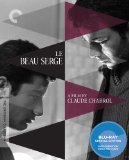| Reviews & Columns |
|
Reviews DVD TV on DVD Blu-ray 4K UHD International DVDs In Theaters Reviews by Studio Video Games Features Collector Series DVDs Easter Egg Database Interviews DVD Talk Radio Feature Articles Columns Anime Talk DVD Savant Horror DVDs The M.O.D. Squad Art House HD Talk Silent DVD
|
DVD Talk Forum |
|
|
| Resources |
|
DVD Price Search Customer Service #'s RCE Info Links |
|
Columns
|
|
|
Le Beau Serge
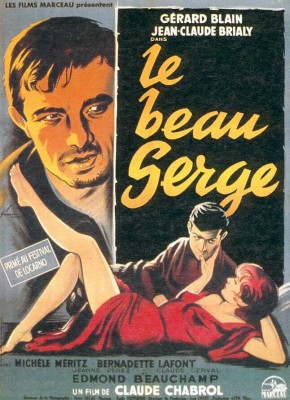
Please Note: The images used here are from promotional stills and other sources, not from the Blu-ray edition under review.
François: "I was furious. It's so disgusting."
Serge: "It's not disgusting. It's practically normal."
François Truffaut called Claude Chabrol's astonishingly confident and accomplished debut, 1958's Le Beau Serge, "a turning point in French cinema," and Criterion's new Blu-ray release of this masterful film lets us see better than ever exactly what he meant. Along with his fellow critics-turned-filmmakers from the legendary French film magazine Cahiers du Cinéma--Godard, Truffaut, Rohmer, Rivette (who makes a droll cameo appearance here, alongside Chabrol himself)--Chabrol came to filmmaking through an obsessive love for the medium, stoked by a voracious, nonstop cinémathèque-filmgoing diet, and it shows: Le Beau Serge was the first feature to emerge from the Cahiers contingent, and it is propelled from start to finish by Chabrol's palpable sense of defiance against stuffy cinematic convention and his ecstatic eagerness to try out and explore for himself those miraculous creative tools, the movie camera and the editing table.
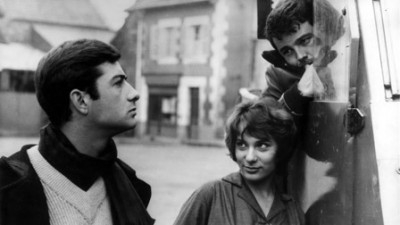
Le Beau Serge's story is concerned with the effects of the return of a convalescing young man, François (Jean-Claude Brialy, A Woman Is a Woman) to his provincial French hometown for some rest and continuing recovery from a close call with tuberculosis. The town is mostly welcoming toward its ambitious prodigal son back from the big city, but there is a disturbing hot/cold, love/hate tension between François and the "handsome Serge" of the title (Gérard Blain (Charlotte et son Jules), sexily intense like some French Monty Clift or Marlon Brando), the best friend François left behind when he went away. "Left behind" as in abandoned: When the very good, very conscientious François sees that Serge has become a poor wreck of an alcoholic with no prospects in life, tortured by the deformity and death of his first child and despairingly fearful that his wife, Yvonne's (Michèle Méritz, Class Tous Risques), current pregnancy will come to the same end, François is overcome with a guilt that is only exacerbated by Yvonne's resentment of him for his close bond with Serge and his having escaped the bleak trap of their village. François begins to try, through subtle persuasion, then teasing, and then scolding, to save Serge from himself, but Serge's self-destructiveness is only a symptom of small-town hopelessness. Another is the exploitative, quasi-incestuous relationship between Marie (Bernadette Lafont)--onetime extramarital lover of Serge and François's current fling--and the old man M. Glomaud (Edmond Beauchamp), like Serge an incurable drunk, who has raised Marie but who is likely not her biological father. François's struggle to help people who don't want to be helped and who resent his efforts (even the jaded town priest tells him to leave, since in his experience this particular flock is past improving) escalates to a literally life-or-death pitch as Serge slips further and further away from François and Yvonne as the dreaded childbirth impends.
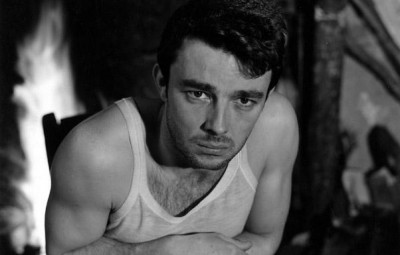
All this sordidness is played out naturalistically, nonjudgmentally; Chabrol's trademark calm, sardonic, not entirely hopeless or humorless nihilism is already present in his nonchalant presentation of what seems atrocious to François and completely natural to the poor souls, who, unlike him, have not been fortunate enough to escape their circumstances. Aiding both the film's laconic, clear-eyed approach to the troubled townspeople's lives and François's building sense of urgency is Chabrol's amazing, assured visual suppleness--the framing, blocking, mise-en-scène, and camera movement in every scene is so fluid, and coordinated with such a relaxed perfection, it's almost impossible to believe that this is the work of a first-time filmmaker--along with the brilliant lighting camerawork in the film's authentic, natural-lit locations by the great New Wave cinematographer Henri Decae (The Lovers, Le Cercle rouge).
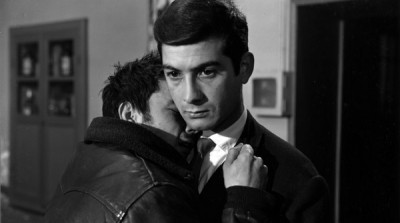
To call Le Beau Serge a promising debut by a talented filmmaker would be to make a laughable understatement; this film is so fully realized, engaging, and free of missteps or first-timer's insecurity/clumsiness, one would not have been misguided to take it as a sure sign of a major director with a long run of great things ahead of him. Chabrol, who died last year after releasing his 60th film, rarely failed to live up to the high standard he set from the beginning with this impressively mature, controlled, and ambitious first foray into a medium that was, in retrospect, just waiting for the reinvigoration Chabrol and his ilk would bring to it.
THE BD:
This AVC/MPEG-4-encoded, 1080p-mastered transfer of Le Beau Serge (presented in its original aspect ratio of 1.33:1) is a sight to behold. Decae's cinematography is preserved so perfectly, one wonders what kind of time-suspending vault the film was stored in or what kind of supernatural restoration technology Criterion had available to make the film appear so brand-new on this edition. This is one of the very best transfers of an older film I have ever seen; it is literally flawless, without a single instance of compression artifacting or even of the more expected and forgivable print wear and flicker.
Sound:The disc's uncompressed PCM monaural soundtrack (in French with very legible, generally well-translated English subtitles) is rich, clear, and full throughout, with some slight mutedness (by today's hi-def standards) merely the result of circa-1958 recording/mixing technology, and precisely zero instances of distortion or imbalance.
Extras:A feature-length audio commentary by Chabrol scholar Guy Austin offers Austin's expert exegesis on this film in addition to an arguably more interesting situating of it in Chabrol's body of work, with Austin examining its likenesses to and distinctions from Chabrol's later films (not neglecting to throw in the kinds of anecdotal tidbits that spice up any commentary, such as Chabrol's and Godard's ongoing, apparently quite serious disagreement over whether a tracking shot or a zoom was aesthetically or ethically preferable).
The other extras mainly center around Chabrol's very personal relationship with Sardent, the village where Le Beau Serge was filmed (and whose residents played many of the film's smaller roles). In Francis Girod's hour-long 2003 documentary, Claude Chabrol: Mon premier film, video interviews with the director and his crew are intercut with footage of Brialy and Lafont revisiting the town, dropping in on the film's locations and resident players (many of whom are now in their 80s). The cheerfully self-deprecating Chabrol discusses his parents' origins in Sardent and his deep connection with the town through having lived there with his grandparents, away from dangerous Paris, during World War II, and he and the crew fill us in on the film's financing, casting, and production, including juicy details regarding on-set flirtations and conflicts. (Brialy and Lafont, for their part, are no less forthcoming.) A postscript informs us that the simultaneous financial success of Le Beau Serge and its immediate follow-up, Les Cousins, made funds available for the production of first films by Rohmer (Le signe du lion) and Rivette (Paris Belongs to Us), making Chabrol the father of the New Wave in more ways than just being the first Cahiers du Cinéma critic to go behind the camera.
Also included are a 10-minute excerpt from a 1969 episode of the French TV show L'Invité du dimanche (The Sunday Guest) in which Rohmer and an interviewer make a return journey to Sardent similar to the one Brialy and Lafont take in Mon premier film; and the film's rather grandiosely hyperbolic, floridly narrated theatrical trailer, which Chabrol recalls, in Mon premier film, being more amused than bothered by, despite having had no hand in creating it. Finally, the enclosed, very well-designed booklet contains abundant stills and an appreciation of the film by critic Terrence Rafferty.
FINAL THOUGHTS:A shot heard 'round the world--if only indirectly, as the bona fide first New Wave feature overshadowed by its immediate successors (The 400 Blows and Breathless)--Le Beau Serge is an unexpected stylistic marvel that also gives a bemused nod to the deeply embedded Catholicism of French culture (a cranky doctor comments on its do-gooding main character's "Christ complex") and anticipates, with its tale of an actually good, kind young man's introduction to the degradation that people who have no way out duly accept as their lot, director Claude Chabrol's career-long preoccupation with the frightening predictability--the real, not-very-pretty, hardly well-adjusted "normal"--of human nature. Like the glorious string of cinema-intoxicated New Wave debuts by Truffaut, Godard, Rivette, Rohmer, etc., etc., that would shortly follow it, there is a vigor at work here, an infatuation with the medium that electrically conducts the filmmaker's intoxication with the moving image on to us as we experience his work. Put on Le Beau Serge (there will never be a better, more meticulously restored edition than this one) and you can revisit once again that moment when the floodgates opened and cinematic innovation, energy, and skill flowed forth freely and abundantly. Highly Recommended.
|
| Popular Reviews |
| Sponsored Links |
|
|
| Sponsored Links |
|
|
| Release List | Reviews | Shop | Newsletter | Forum | DVD Giveaways | Blu-Ray | Advertise |
|
Copyright 2024 DVDTalk.com All Rights Reserved. Legal Info, Privacy Policy, Terms of Use,
Manage Preferences,
Your Privacy Choices | |||||||









